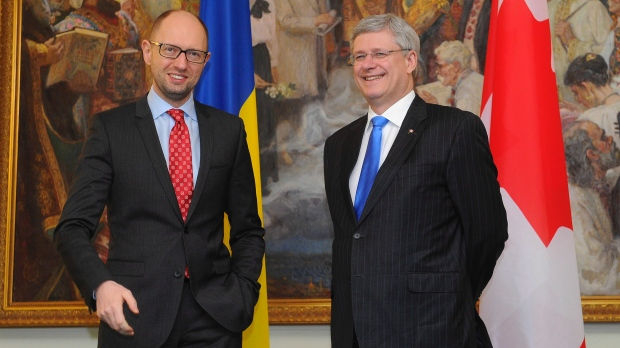Earlier this spring, a Russian court in the southern Caucasus city of Yessentuki sought an international arrest warrant for Arseniy Yatsenyuk, accusing the former prime minister of Ukraine of being involved in the torture and execution of captured Russian soldiers in Chechnya in 1995.
Last week, according to Sputnik International, an online news organization operated by the Russian government, a spokesperson for the Investigative Committee of the Russian Federation said the national investigative agency intended to seek the extradition and prosecution of Yetsenyuk for the killings, which the court said occurred while the former Ukrainian PM was fighting alongside Chechen rebels against Russian troops. The Russian Prosecutor General’s Office confirmed the plan.
For those inclined to dismiss reports from such a source as likely to be “fake news,” they have been confirmed by Radio Free Europe, an online and broadcast news organization operated by the United States government, which also reported the Ukrainian government’s assertion that the charges are politically motivated.
A report in the online Kyiv Post on Saturday quoted sources in the Ukraine government saying Interpol would refuse to follow up on the Russian request.
Readers may well ask: Why should any of this matter to Canadians?
The answer, as reported in this space last summer, is that Yatsenyuk and members of his family may have been quietly granted expedited Canadian citizenship by the government of Conservative prime minister Stephen Harper in 2015 and issued Canadian passports.
In late June 2016, in response to queries from this blog, a spokesperson for Immigration, Refugees and Citizenship Canada refused to comment on reports in Russian media that Yatsenyuk had been granted Canadian citizenship as part of a deal by Western powers to protect him and ensure the safety of his family for his role in the country’s affairs after the so-called Euromaidan demonstrations resulted in a violent change of government in Ukraine in early 2014.
“Due to privacy concerns we cannot comment on specific cases without consent,” IRCC spokesperson Lindsay Wemp told me in late June in an email. She confirmed, however, that 29 people had received expedited Canadian citizenship that year under a section of the Citizenship Act that grants discretionary powers to the minister and members of cabinet.
Harper himself, then-immigration minister Chris Alexander, who is now a candidate to lead the federal Conservative Party, and former immigration and defence minister Jason Kenney, now leader of the Alberta Progressive Conservative Party, were all strong and vocal supporters of the post-Euromaidan Ukraine government in which Yatsenyuk served — a policy enthusiastically continued under Prime Minister Justin Trudeau by Liberal Foreign Minister Chrystia Freeland.
In a heated speech to the Ukrainian Canadian Congress in Toronto on Feb. 22, 2015, Alexander accused Russian President Vladimir Putin of “terrorism” in Ukraine and claimed online Russian news organizations like Sputnik are “preaching poison” to Canadians about what was happening in Ukraine.
When a report by a Moscow-based online journalist surfaced earlier this spring that Freeland’s Ukrainian maternal grandfather had been a Nazi collaborator during the Second World War, she initially dismissed the story as Russian-inspired disinformation — although it was soon revealed by Canadian media to be accurate and factual.
So while the Russian charges against Yatsenyuk may not be justified and could be politically motivated, surely they must now be a matter of concern to Canadian authorities.
No one in Canada’s mainstream media appears to have followed up on the original reports Yatsenyuk and his family were given Canadian citizenship, although perhaps they should be now if the situation is going to involve Canada in an extradition battle with Russia.
This post also appears on David Climenhaga’s blog, AlbertaPolitics.ca.




